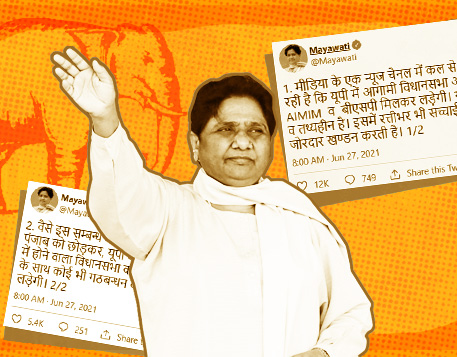
Dalit leaders Mayawati and Manjhi opting out of alliance could hurt Opposition

Days before the first meeting of a grand Opposition alliance in Patna, the BJP is silently celebrating as political leaders representing the sizeable Dalit voter base are keeping away from the Congress-led alliance that is taking shape against the Modi government.
The first to raise a banner against the Opposition alliance is former Uttar Pradesh chief minister Mayawati, chief of the Bahujan Samaj Party (BSP), after she was not invited to the meeting scheduled for June 23.
“There is a common link between all political parties that are willing to participate in the first meeting of Opposition parties in Patna. The few things that are common are that all political parties strongly believe in secularism, socialism and Indian values, and they are all firmly anti-BJP. In that aspect, we feel Mayawati is still confused. The BSP leadership has yet to decide if they are with the opposition or not,” said Naval Kishore, national spokesperson of the Rashtriya Janata Dal (RJD).
The absence of Mayawati from the Opposition alliance has brought some respite to the Bharatiya Janata Party (BJP) leadership in Uttar Pradesh. Senior BJP leaders believe that a three-cornered electoral contest between the BJP, BSP and Samajwadi Party (SP) will help divide the anti-BJP vote and will benefit the party both in the state and in the national election of 2024.
Also read: Despite Karnataka win, why it’s going to be tricky for Oppn in 2024 polls
Jatav support
Senior leaders of the BJP also point out that Mayawati enjoys the unflinching support of the dominant Jatav community within Dalits and any consolidation of the Jatavs in favour of Mayawati will help the BJP because of the reverse polarisation of smaller Dalit communities who have not benefitted under Mayawati as much as the Jatavs.
“BJP is in a very favourable position in Uttar Pradesh. BSP chief Mayawati has decided to contest alone this time, so that a multi-party contest will be in favour of the BJP because it will divide anti-BJP votes. The presence of Mayawati will consolidate Jatavs in favour of the BSP and will bring non-Jatav Dalits closer to the BJP,” said a senior BJP legislator who was a cabinet minister in the Uttar Pradesh government.
The former minister added that the BJP is of the firm opinion that it will remain a dominant party in the state and will win a majority of the 80 Lok Sabha seats in 2024 too.
Opposition party members are circumspect about the BSP leadership because it is in alliance with the Shiromani Akali Dal (SAD) in Punjab.
Both the SAD and BSP have often supported the BJP on crucial issues, including the recent decision of the opposition parties to boycott the inauguration of the new parliament building.
Also read: Will get washed away like Bihar bridge: Smriti Irani’s jibe over Opposition meet
Opposition assessment
“We say Mayawati is confused about joining the Opposition because she supported the BJP when all Opposition parties decided to boycott the inauguration of Parliament building. Similarly, the BSP also supported President Draupadi Murmu during the election for president,” Kishore added.
After the Opposition parties snubbed Mayawati by not inviting her to the Opposition meeting, the BSP chief announced on June 9 that she would be the prime ministerial candidate of her party and that she would not be part of any alliance. The BSP has decided to contest alone in the upcoming assembly and general elections.
The absence of Mayawati from the Opposition fold could impact the Congress party the most because Mayawati is likely to contest against the opposition in states like Uttar Pradesh and also in the upcoming Assembly elections in Madhya Pradesh and Rajasthan. During the 2018 assembly polls in these two states, the Congress tried to unite the opposition parties and wanted to form an alliance with the BSP in both states.
While Mayawati has backed herself in Uttar Pradesh, the division of Dalit votes is also taking shape in Bihar. In a major development, Santosh Suman, son of former Bihar chief minister Jitan Ram Manjhi, resigned on June 14 from the council of ministers in the Nitish Kumar government. Suman is a leader of the Hindustani Awam Morcha (HAM) and was part of the Mahagatbandhan or Grand Alliance in Bihar.
Also read: Stalin ups anti-BJP ante, asks Opposition parties to bury differences for united front
Manjhi factor
The breakup in the political alliance between Nitish Kumar and Manjhi took place after the latter alleged that the Bihar chief minister was forcing him to merge his party with the Janata Dal (United). The parting seems to be bitter as Nitish Kumar alleged that Manjhi was working against the Grand Alliance and was providing information about their plans to the BJP.
“I asked them to either merge the party or part ways from the Mahagathbandhan. They decided to quit the alliance. Had they been in the ‘Mahagathbandhan’ and attended the June 23 meeting, they would have told everything to the BJP,” said Nitish Kumar on Friday.
Political analysts believe that leaders like Mayawati and Jitan Ram Manjhi do not enjoy the same kind of social backing from Dalits as they used to, and the two leaders have not been very vocal on some of the crucial issues.
“The situation has changed tremendously for Mayawati. The BSP is no longer a relevant force in Madhya Pradesh, Rajasthan and Chhattisgarh. In Uttar Pradesh, Mayawati has not been vocal on many issues, and the BSP is losing its voter base. The case is the same for Jitan Ram Manjhi, who is also not playing a decisive role in Bihar,” said Yatindra Singh Sisodia, director at the Madhya Pradesh Institute of Social Science Research, Ujjain.
Also read: Karnataka: Why even in such a resounding win, there are signs of worry for Congress

